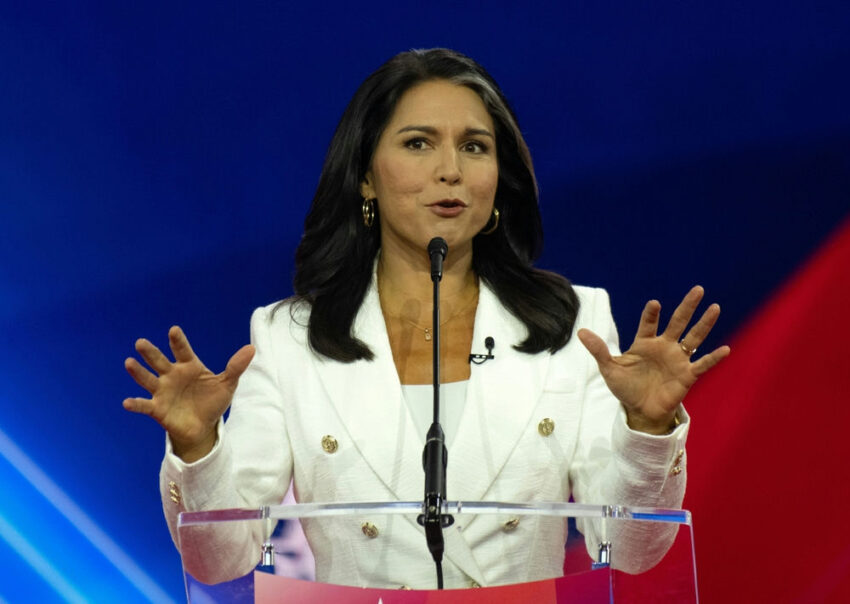DNI Tulsi Gabbard’s sweeping overhaul slashes the Biden-era censorship center at the heart of intelligence politicization, sending shockwaves through Washington and marking a definitive stand against government overreach and attacks on free speech.f
Gabbard’s Historic Overhaul Targets Years of Political Weaponization
On August 21, 2025, Director of National Intelligence Tulsi Gabbard announced the largest staff reduction in ODNI history, cutting over 40% of the workforce and closing several offices. This unprecedented move comes after years of mounting evidence that intelligence agencies, particularly the FMIC, had been leveraged to suppress free speech and silence political opposition—especially during and after the 2020 election cycle. Under Gabbard’s leadership and President Trump’s administration, ODNI’s mission is being realigned to its original purpose: defending national security, not targeting American citizens for their views.
The FMIC, originally established by the Biden administration in 2022, quickly gained notoriety for its controversial coordination with social media giants to moderate and sometimes censor online content. Revelations from the “Twitter Files” and congressional hearings exposed direct government involvement in suppressing stories such as the Hunter Biden laptop scandal. Instead of focusing on genuine foreign threats, FMIC’s powers expanded to include policing the speech of everyday Americans—a direct affront to the First Amendment and a cause of deep frustration among conservatives.
Restoring Constitutional Rights and Fiscal Discipline
Gabbard’s ODNI 2.0 reforms explicitly target these abuses, downsizing FMIC’s authorities and folding its remaining legitimate functions into other intelligence divisions. Gabbard publicly acknowledged past missteps, stating that “ending the weaponization of intelligence and holding bad actors accountable are essential to begin to earn the American people’s trust which has long been eroded.” The reforms also close redundant offices—like the External Research Council and the Strategic Futures Group—and refocus efforts on modernization through technologies such as artificial intelligence and quantum computing, all while upholding constitutional freedoms.
Fiscal responsibility is another cornerstone of the overhaul. The ODNI estimates that these changes will save taxpayers over $700 million annually. For years, unchecked expansion and duplication within the intelligence bureaucracy have fueled waste and inefficiency. Gabbard’s actions reflect a commitment to smaller, smarter government and a rejection of the overspending and fiscal mismanagement that fueled inflation and eroded economic security during previous administrations.
Balancing Security, Liberty, and Public Trust
The reforms address more than just the size of government—they strike at the heart of public distrust. The intelligence community’s involvement in content moderation and election influence under past leadership created a chilling effect on free speech and undermined faith in American institutions. By curtailing FMIC’s power and emphasizing transparency, the Trump administration aims to restore constitutional protections and reestablish the proper boundaries between government and private enterprise.
Some experts warn that rapid downsizing could risk losing institutional knowledge or diminish capacity to counter legitimate foreign threats. However, civil liberties advocates and constitutional scholars generally support aggressive efforts to end government censorship and political targeting. The debate over how best to balance national security with individual liberty continues, but the reforms mark a decisive conservative victory in the long-running struggle against bureaucratic overreach and left-wing agendas.
Ripple Effects and Ongoing Oversight
Gabbard’s restructuring has immediate and far-reaching implications. ODNI and FMIC employees face disruption and uncertainty, but the American public gains a leaner, more accountable intelligence community. The reforms also signal a broader push for transparency and oversight across all federal agencies, setting a new standard for how government should serve—not control—the people. Congress retains oversight of FMIC’s existence, ensuring that the legislative branch remains a check on executive action. As ODNI implements these changes, scrutiny of government partnerships with tech companies will likely intensify, reinforcing the principle that American freedoms come before bureaucratic convenience or political gain.
DNI Gabbard Guts, Neuters Biden Censorship Center That Promoted Russia Collusion Hoaxhttps://t.co/Bzd7TBRhRU
— MRCTV (@mrctv) August 22, 2025
As the Trump administration moves forward with these reforms, the message is clear: political weaponization of intelligence will not be tolerated, and the rights of everyday Americans—especially free speech and self-determination—must be protected from government interference. The path to restoring trust in our institutions is underway, and for many conservatives, this long-overdue reckoning is a victory for both common sense and constitutional values.
Sources:
Gabbard cutting Director of National Intelligence staff by over 40 percent
Click this link for the original source of this article.
Author: Editorial Team
This content is courtesy of, and owned and copyrighted by, https://www.conservativecardinal.com and its author. This content is made available by use of the public RSS feed offered by the host site and is used for educational purposes only. If you are the author or represent the host site and would like this content removed now and in the future, please contact USSANews.com using the email address in the Contact page found in the website menu.





